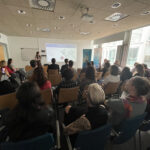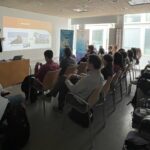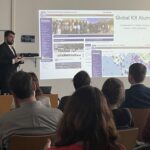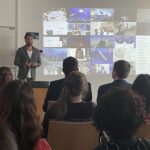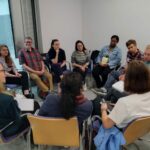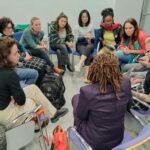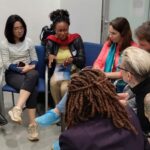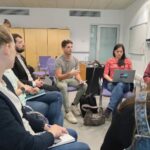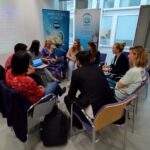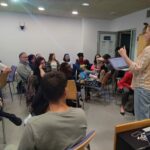Ocean Decade Week for the ECOP Programme kicked off on Monday 8 April with our first off-site satellite event called: “Capacity Development for the Ocean We Want: Exploring Science Communication and Solving Global Capacity Development Challenges”
This event was co-organised by the ECOP Programme, International Ocean Institute (IOI), Institute of Marine Engineering, Science and Technology (IMarEST), National Inter-University Consortium for Marine Sciences (CoNISMa), Association of Polar Early Career Scientists (APECS), Nippon Foundation-University of Edinburgh Ocean Voices Programme, and held at the Institut de Cièncias del Mar (ICM), on Barcelona’s waterfront. The event featured presentations from guest speakers (Tiago Garcia, Cosmin Chivu and Conor Savage) and concluded with an interactive and action-oriented mini-hackathon.
The aim of the event was to work towards innovative and efficient solutions for addressing specific challenges. The challenges related to how to tackle capacity development for Early Career Ocean Professionals (ECOPs) and as one of the first events of Ocean Decade Week, it was extremely exciting to host a room full of (mainly) ECOPs, all anticipating the week ahead and eager to work together.
Evgeniia Kostainaia, Global Coordinator of the ECOP Programme welcomed everyone and introduced the first speaker: Tiago Garcia, Communication Officer at +ATLANTIC CoLAB. Tiago began his talk by questioning how we can change the narrative within science communication, before giving an extremely personal and engaging presentation. An expert storyteller, with a background in coastal science, Tiago encouraged the audience to think outside the box when it comes to promoting ocean science to policy makers, funders and the general public.
Tiago’s real life example of engaging younger audiences through sci-comms was Projeto 19, a project he and other members of +ATLANTIC CoLAB, alongside Portuguese Blue School (Escola Azul) partners coordinated, whereby high school students converted research papers into outreach activities and artistic performances. Projeto 19 aims to integrate the use of reliable up-to-date scientific information, as interpreted by teenagers to increase their knowledge on the ocean and its role on the planet dynamics and life. Learning about the creative process and outstanding results of this initiative really got the audience thinking.
The next presentations were Cosmin Chivu from IOI and Conor Savage from the ECOP Programme, who shared case studies about capacity development from both a broad and more focussed perspective. Cosmin, as Project Officer, for International Ocean Institute HQ in Malta, shared how the impact and continuity of the IOI’s Capacity Building Programmes is creating global Ocean leadership and empowering ECOPs. He highlighted how important it is for organisations to create participation mechanisms and prioritize capacity development opportunities that bring ECOPs, scientists, practitioners, and other stakeholders in close collaboration – allowing for peer-to-peer learning. He shared how the IOI Ocean Academy Courses are doing exactly that, especially for those from developing countries and countries in transition.
Conor, who is Training and Mentoring Task Team Manager for the ECOP Programme led the audience through his talk: “How to reach out and communicate science to non-academic audiences”. Having taken the leap from the Academic World, and studying the Arctic, to the business World, Conor’s extensive background includes leading a team of 20 colleagues to develop and deliver climate change, biodiversity, and other sustainability-related training to 10,000+ attendees, over two years. His work raised the base level of knowledge across the business so that more advanced learning materials could be developed centrally and rolled out, and his guidance for reaching “non expert” audiences included the art of passionate storytelling to draw people into the topic.
After the presentations, the audience was split into three groups and were lead through the mini-hackathon questions based on three different scenarios. This part of the event addressed specific challenges related to capacity development, which is crucial for building the necessary expertise and capabilities to achieve the Decade’s objectives. The groups were given the following scenarios to discuss:-
Group 1: As organizers of a rather small scientific conference/meeting focused on SDG14: Life Below Water, describe how you would invite and engage with more diverse stakeholders, such as business owners, media, ports authorities, oil and gas companies and shipping companies. How would you meet their needs, whilst trying to encourage cross-sector dialogues within the blue economy?
Group 2: In order to advance your career and gain access to new professional opportunities, it is important for you to attend workshops and conferences in your field. What networks, websites, institutions, etc do you rely on to find funding? What could be done to make the process of finding funding opportunities easier?
Group 3: Complex Ocean issues such as those related to sustainable development, climate change and environmental management and planning are characterized by high uncertainties about the research agenda, tools, choices and solutions to adopt, and the impacts these choices may have on different components of socio-ecological systems. What gaps can you identify right now in the available capacity development, education and training offerings in the Ocean sector?
The session fostered peer-to-peer exchanges and learning opportunities, breaking down silos and promoting interdisciplinary collaboration and empowering ECOPs with practical skills and tools that can be applied when addressing real-world challenges facing the Ocean.
Along with promoting inclusivity and equity by ensuring participation of ECOPs from diverse backgrounds and sectors, this event provided an opportunity for skill development and knowledge sharing. There was ample time and space that allowed for the creation of a supportive environment for peer-to-peer exchanges and learning, and after the session, each group presented their collaborative ideas to the whole group, allowing for further discussion with the wider audience and sparking several more suggestions and announcements related to ECOP capacity development. The event concluded with the ECOP Programme sharing its new resource to support ECOPs on their capacity development journey: a database of mentoring programmes, as well as training/funding databases.
As the first ever Global ECOP in person events, there is hope that this effort will contribute to the vision and mission of the Ocean Decade through providing a focus on supporting ECOPs to further develop their skills, learn necessary tools and contribute to the evolution of their careers. It was agreed that this opportunity to gather in person, provided an essential starting point for creating or building upon platforms or networks for continued collaboration and knowledge sharing among participants beyond the event.
This event also highlighted the importance of financial support for capacity development initiatives and addressing such funding gaps. The ECOP Programme is dedicated to addressing the longevity and effectiveness of successful capacity development projects through long-term targeted funding and will continue to advocate for increased funding and financial grants to support capacity development efforts, ensuring inclusivity and equity in participation.
Finally, this event contributed to the advancement of the ECOP Programme by providing feedback on financial and capacity development needs. As these needs are quite universal across many endorsed Actions, we believe that the event was helpful for representatives of any endorsed Actions that were present at the event.
The ECOP Programme will be reflecting on and implementing the concrete suggestions and recommendations gathered during the event to enhance capacity development initiatives within the Ocean Decade, and soon sharing these in the Ocean Decade Conference Impact Report.
Special thanks to the hackathon moderators: Victoria Mentor, Ali Hochberg and Gabriel Juma, as well as their respective note takers, for guiding the groups through the scenarios.
